Azerbaijani operation spread anti-France content amid 2024 New Caledonia unrest
Hashtag analysis reveals coordinated influence efforts surrounding voting reform protests in the French Pacific territory of New Caledonia
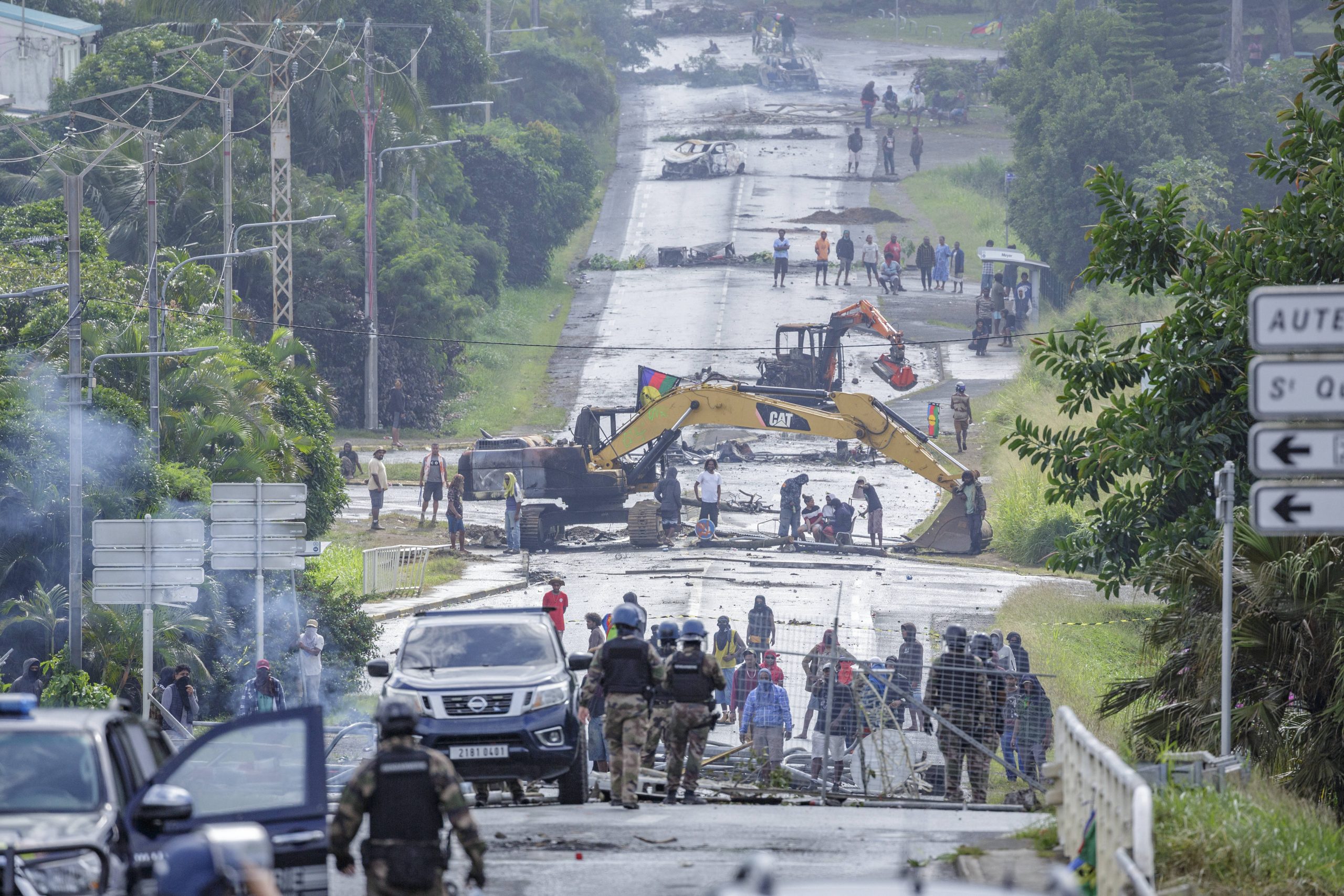
Banner: Blockage on rue Iékawé of Noumea on May 15, 2024, amid protests linked to a debate on a constitutional bill aimed at enlarging the electorate for upcoming elections of the overseas French territory of New Caledonia. (Source: MMIIAS/ABACAPRESS.COM via Reuters Connect)
In May 2024, as riots broke out in the French Pacific territory of New Caledonia, suspicious Azerbaijani accounts launched a campaign targeting French authorities and their handling of the crisis. Between May 13 and May 19 of that year, X accounts, including some that self-identified as supporters or officials of Azerbaijan’s ruling party, attempted to influence online discussions by spreading inflammatory claims and videos. Most of the accounts were suspended soon after the campaign.
New Caledonia, a French overseas territory located nearly 17,000 kilometers from Paris, experienced significant unrest in May 2024 following the adoption of voting reforms. The Nouméa Accord of 1998 granted voting rights to New Caledonia’s indigenous Kanak people, and those already eligible to vote in 1998 retained their voting rights. However, the constitutional amendment passed on May 13, 2024, permitted residents who have lived on the island for at least ten years to vote, diminishing the electoral influence of the indigenous Kanaks, representing 41.2 percent of the island’s population according to a 2019 census. The Kanak people see the reforms as a threat that may place them in the voting minority amidst the influx of European immigration to the island.
On May 13, 2024, as clashes broke out during protests against the constitutional change, France declared a state of emergency in New Caledonia, deployed troops to the region, announced a curfew, and banned TikTok. The French Republic High Commissioner in New Caledonia announced that the TikTok ban was lifted on May 29, 2024. The turmoil in New Caledonia led to the death of thirteen people, including two law enforcement agents, and hundreds of injuries. Reportedly, around 2,500 people have been arrested since the riots in May.
On May 22, French President Emmanuel Macron visited the island, and on June 12, he suspended the controversial electoral reform.
In September 2025, French authorities, fearing the outbreak of more clashes, tightened curfews and banned gatherings before the September 24 anniversary of the French takeover. In early October, France’s new prime minister, Michel Barnier, announced that the provincial election, initially scheduled on December 15, 2024, would be postponed until the end of 2025.
Meanwhile, during the Azerbaijani-hosted COP29 conference in November, President Ilham Aliyev commented on the New Caledonia protests, blaming the “French regime” for “human rights violations” and “brutally suppressing” community voices. Following Aliyev’s statements, French Ecological Transition Minister Agnès Pannier-Runacher accused Azerbaijan of “instrumentalizing” the fight against climate crisis for “its shameful personal agenda” and said she would not attend COP29 in Baku.
Azerbaijan-France relations
On May 16, 2024, amid the protests, French Interior Minister Gerald Darmanin accused Azerbaijan of interfering in New Caledonia’s affairs. On the same day, the Ministry of Foreign Affairs of Azerbaijan issued a statement denying Darmanin’s accusations.
Azerbaijan has a history of anti-France activity. As 2019-2022 chair of the Non-Aligned Movement, Azerbaijan focused part of its mandate on opposing French “neo-colonialism.” During its tenure, Azerbaijan established the Baku Initiative Group, which appointed leaders from French overseas territories to various positions and promoted anti-colonial narratives. In a November 2023 statement to the Baku Initiative Group, Azerbaijani President Aliyev accused France of pursuing a militaristic policy by arming Armenia and encouraging revanchist forces in the country, claiming this laid the groundwork for new conflicts in the South Caucasus.
In July 2024, the Baku Initiative Group sponsored the first “Congress of Independence Movements from French-colonized Territories.” It launched an online platform called FILDECOF, a French acronym for “International front for the liberation of the last French colonies.” The congress was reportedly attended by fifteen “political parties and independence movements” from French overseas territories.
Activity in the lead-up to the voting reforms
Pro-Azerbaijani social media accounts and the Baku Initiative Group posted inflammatory content and political ads in the leadup to the New Caledonia voting reforms being adopted by the French Parliament. On X, some accounts engaged in the coordinated posting of content promoting the Baku Initiative Group and furthering accusations of French neo-colonialism.
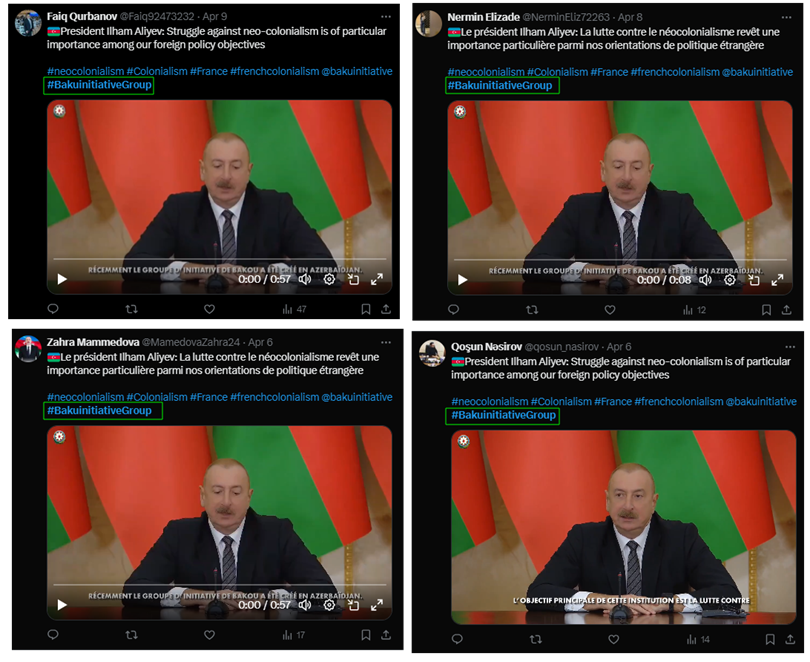
The Baku Initiative Group’s Facebook page posted advertisements containing video footage about French colonization and calls for a demonstration. In April and early May 2024, in the leadup to the voting reforms, the group’s Facebook page reposted a petition against the reform, stating, “No to the enlargement of the electoral body! So that New Caledonian citizens can make the best decisions for their country!”
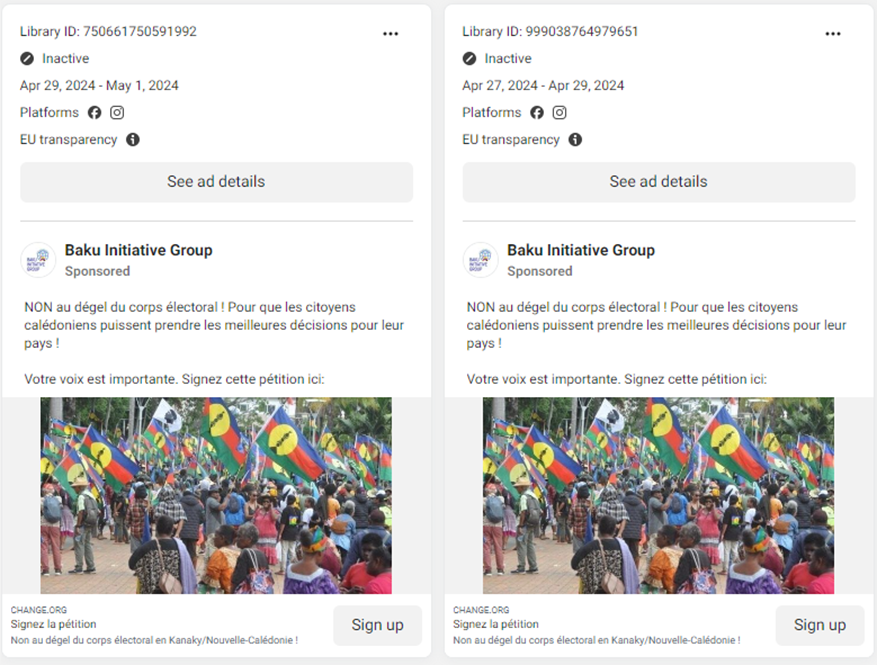
On May 6, the Baku Initiative group posted a video about the “Detrimental Impact of #FrenchColonialism on Indigenous Communities” and used the hashtag “#Kanaky,” New Caledonia’s indigenous name. The video, which appears to be using an AI-generated voiceover, retraces the French colonization of the island and the indigenous Kanak people’s struggle to obtain independence.

On May 13, when the constitutional reform overseeing the extension of New Caledonia’s electoral body was adopted, the group posted a sponsored ad on Instagram in support of a rally to be held in Corsica. However, population data retrieved from the Meta Ad Library shows that the ad’s publishers misspelled “Corsica” and erroneously targeted the city of Corsico, Italy.
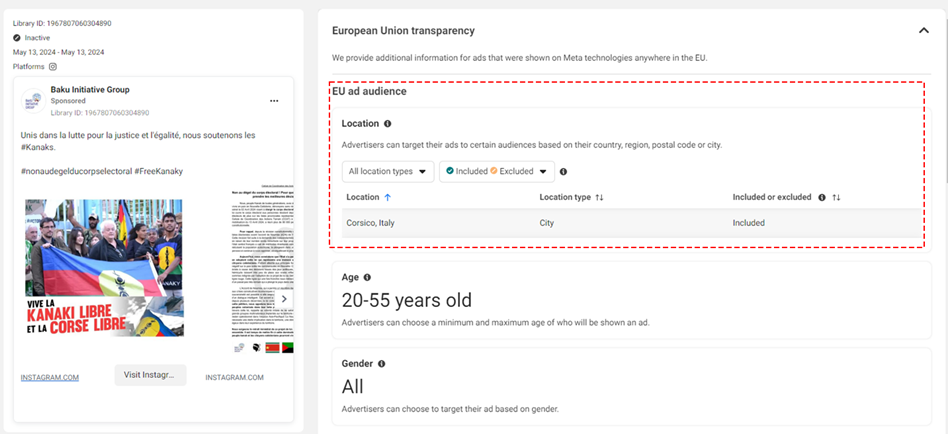
On X, accounts claim links to ruling party
Soon after the May 2024 protests, France’s disinformation watchdog VIGINUM published a report that attributed New Caledonia-related online activities to supporters of the ruling New Azerbaijan Party (YAP). VIGINUM reported that one account, @bafadarovislam, could be tied directly to the ruling party as it belonged to an individual who served as a YAP consultant and had an e-mail address belonging to the ruling party (@yap.az).
Azerbaijani news agency APA published a statement from YAP denying the accusation. In the English version of the statement, YAP said that the party’s official accounts did not post about the New Caledonia protests on social media. However, in the longer Azerbaijani version of the statement, Nurlan Galandarli, Head of the Information Technologies and Public Relations Department of YAP Central Office, said, “It is natural for citizens of Azerbaijan, including those among the 700,000 plus members of the New Azerbaijan Party, to express their personal views on this matter. This aligns completely with democratic principles, including freedom of speech and expression – the very values that French officials so often ’emphasize’ in their political rhetoric, such expression of views cannot be dismissed as part of any orchestrated negative PR campaign.”
To further understand the impact of Azerbaijani accounts on the information space surrounding the New Caledonia protests, in May 2024 the DFRLab analyzed, using the monitoring tool Meltwater Explore, five hashtags (#BoycottParis2024, #NoParis2024, #RecognizeNewCaledonia, #EndFrenchColonialism, and #FrenchColonialism) circulating on social media platforms from May 13 to 17. The mentions for these hashtags peaked on May 15. Some X accounts named in VIGINUM’s report engaged with the hashtags; they include @bafadarovislam (attributed by VIGINUM to YAP), @elmeddinbehbud (attributed by VIGINUM to an Azerbaijani state agency and described as the “first-broadcaster” of one of the campaign videos), @muxtarnag, @chloe46221792, @Lucie14770791, @Sophia017215336, @HeyderovaG9871, @ulviyy_ali99, @ayshanaslan, and @Antoine1524.

The hashtag #BoycottParis2024 was the most popular, with more than 7,000 mentions, including replies.

Excluding replies, we identified 6,562 mentions of one or more of the hashtags by 1,936 accounts. According to the Meltwater Explore query, most of the accounts originated from Azerbaijan.
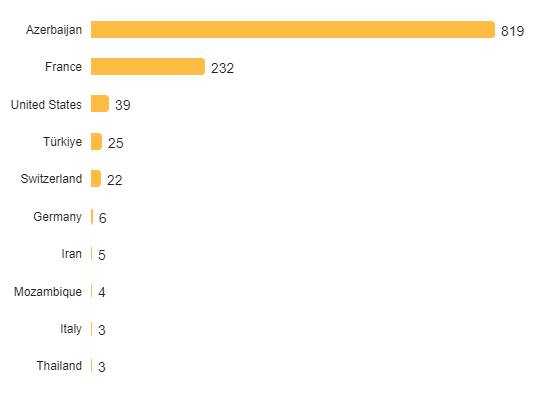
In our analysis of the hashtags, we observed suspicious accounts that spread identical text and visuals to accuse French police of violence in New Caledonia.
Many X accounts noted their support for YAP in their bio, while others claimed to be officials in the ruling party. All the examined accounts that mentioned “YAP” in their bio have since been suspended.

The DFRLab identified sixty-seven users who mentioned “YAP” in their bio. Twenty-four bios included an official position and branch in YAP. Five users self-identified as a YAP “supporter” or “activist.” Thirty-eight accounts were categorized as unknown because they shared only the party slogan or mentioned only a branch name without specifying a position.
The tables below catalogue the dataset of accounts that mentioned YAP in their bio. The first table lists cases where we could verify via at least one external source (news websites or social media platform) that an individual with the same name as the account was active within the party. While this indicates the accounts that self-identified as officials used the real names of YAP officials, it is difficult to confirm via open-source tools whether these accounts genuinely belonged to and were operated by the officials.
Additionally, we found the names of five of the thirty-eight accounts catalogued as unknown matched the names of individuals at YAP party branches; however given that they did not self-identify as officials in their bio, we catalogued them in a different group.
In two instances, records from the Internet Archive indicated that the profile pictures of two X accounts claiming to be party officials aligned with photos of the individuals used on local news websites. While this is not enough evidence to confirm the accounts were operated by government officials, it indicates the use of genuine images.


Activity of accounts claiming links to YAP
The accounts with full names that matched individuals representing YAP posted the five hashtags 102 times between May 13 and May 17. Most of the activity occurred on May 15, when 4,495 original posts were published containing the five analyzed hashtags. Of these posts, 214 were made by thirty accounts that mentioned YAP in their bio. Twenty-two of these thirty accounts self-identified as YAP officials; in twenty cases, we were able to verify that the account name matched the name of a YAP official. On May 15, the group of thirty accounts posted identical text 210 times, which stated, “The French [sic] police are murderers – Algerian Murders continues”.
Analyzing the posts’ timestamps revealed that on May 15, some accounts posted the same text within the same minute, while others made identical posts one minute apart. In one example, four different accounts, @ArazXudanov (self-identified YAP official, with an external source confirming an individual with the same name works in the same branch of YAP), @ahmedov_rovshen (relation to YAP is unknown), @Nurlanagam67003 (bio mentions YAP branch in Jalilabad and an external source confirms an individual with the same name works in the same branch as a consultant), and @Lale_mensimova1 (relation to YAP is unknown), posted, “The French police are murderers – Algerian Murders continues,” using an identical visual that featured French and English text.

In some instances, the same account posted the same text and image twice within the same minute, changing only the language of the text overlayed on the graphic. One account that participated in this behavior is @zamir_huseynov, whose bio mentions the name of the YAP branch, “YAP Goygol District Organization,” without specifying a position. The DFRLab found media reports that verify an individual with the same name, Zamir Hüseynov, is the head of the Goygol branch of YAP. However, it is not possible to confirm that the @zamir_huseynov account is operated by YAP official Zamir Hüseynov.

Content posted by the wider dataset
Python was used to examine the posting activity of the broader dataset of 1,936 accounts that engaged with the five hashtags. We examined 4,684 posts shared on May 15, 2024, in 15-minute intervals. Analyzing specific time intervals helps to identify patterns in posting behavior. According to the results, there were fourteen 15-minute intervals in which more than 100 posts were shared, totaling 3,284 posts shared during these high-activity intervals.
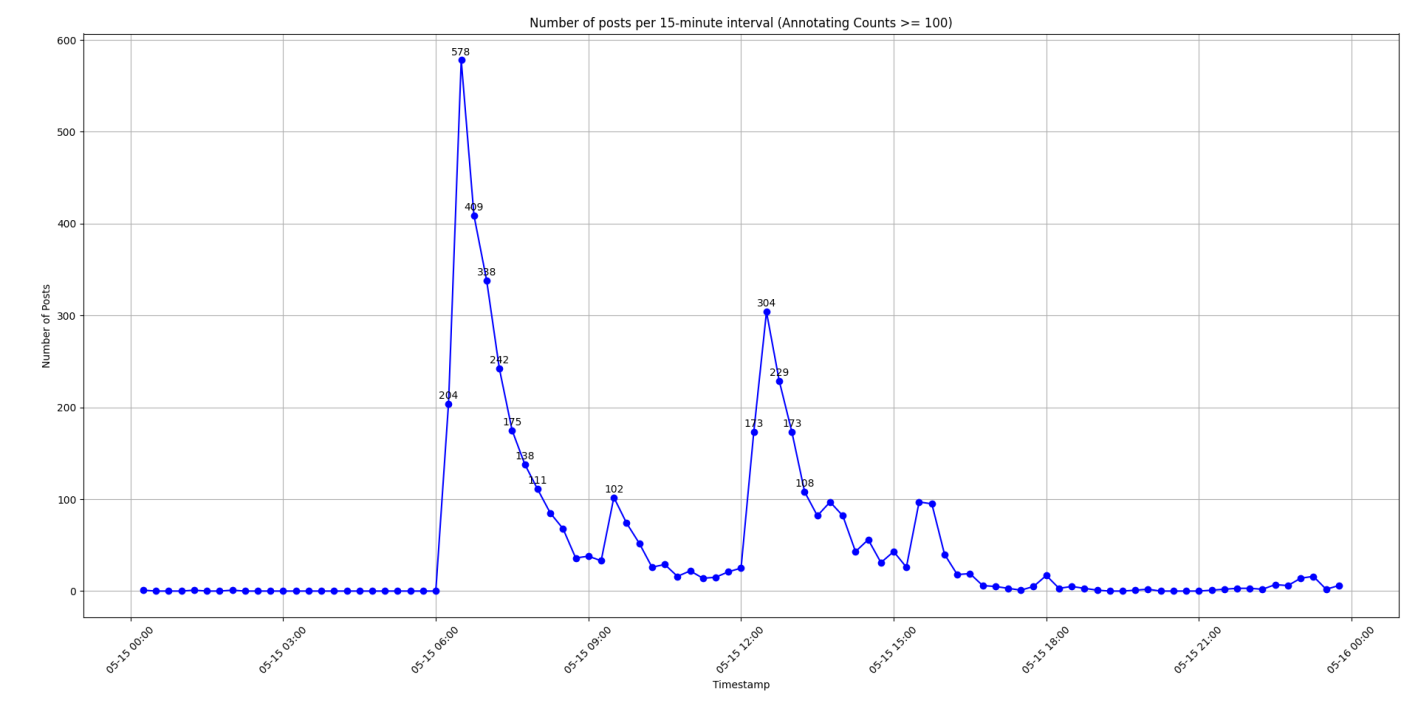
Additionally, the DFRLab calculated the Coefficient of Traffic Manipulation (CTM) score for different days within the New Caledonia dataset to identify potential traffic manipulation on X. May 13, 14, and 17 had less than 1,000 posts per day, so we focused on May 15 and 16, which had 4,684 and 1,486 posts, respectively. We calculated the CTM scores as 9.78 and 20.1, respectively. The original CTM study indicates a score above twelve can be considered “suspicious.”
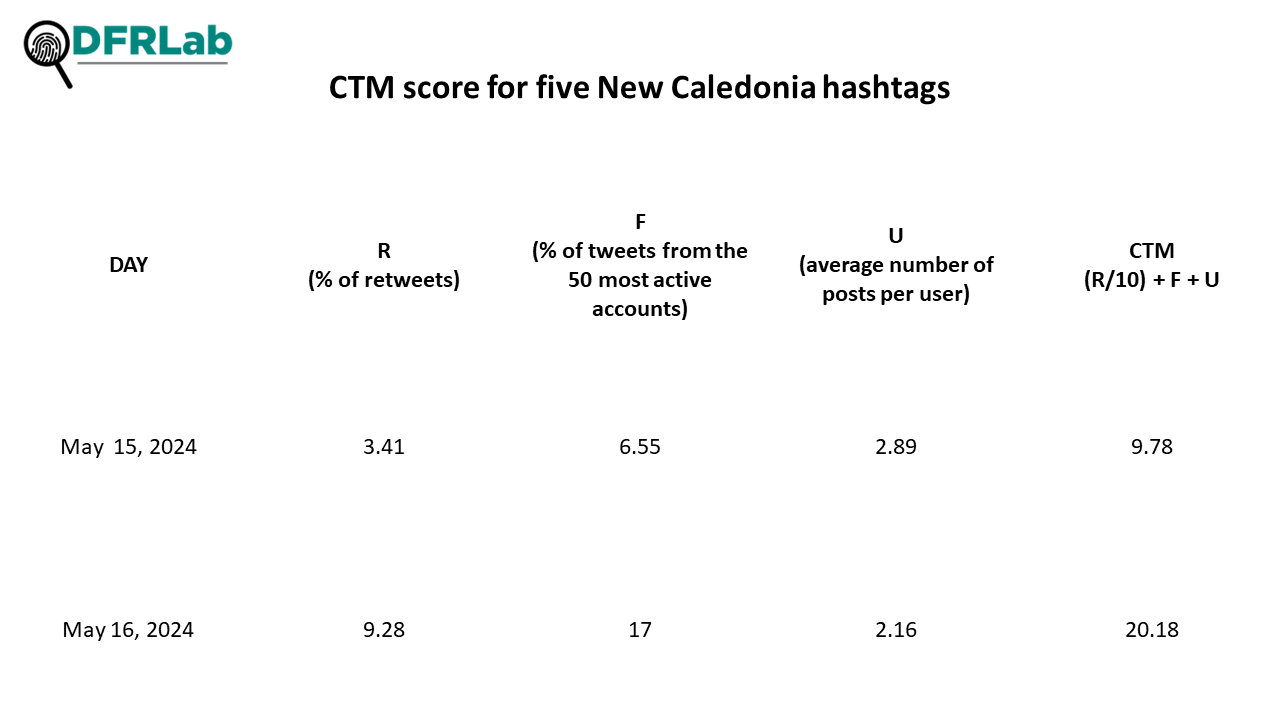
On May 18, using the same five hashtags, accounts engaged in memetic warfare and trolling activity. The DFRLab found that three accounts spread a meme alleging that Azerbaijan is interfering in French domestic affairs in retaliation for France’s reported interference in Azerbaijani domestic affairs in 2023.
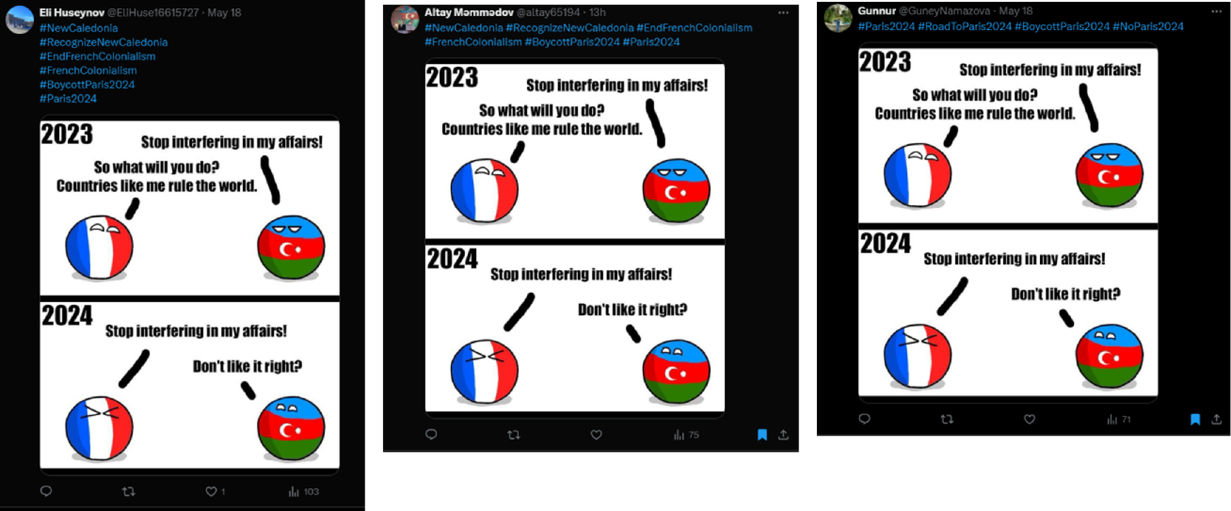
‘Martial law’ narrative and links to Russia
On May 18, sixty-nine accounts reposted an unverified claim that suggested France had declared “martial law” in New Caledonia. Six of the accounts exhibited signs of inauthentic behavior. Altogether, seventy-seven posts included the phrase, “France declared martial law in New Caledonia,” published alongside images of unrest on the island.
According to the X account @RandomOsint, the account for Voice of Europe posted that New Caledonia had introduced “martial law” on the island. On May 17, the European Union announced that it had banned Voice of Europe and three other media outlets because they were “under the permanent direct or indirect control” of Russia.
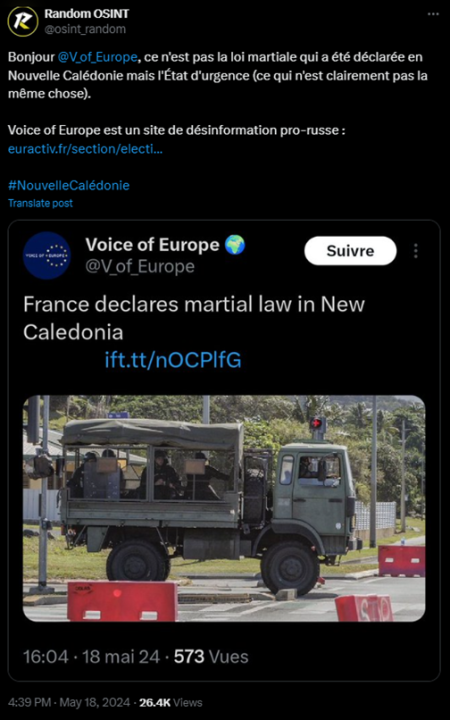
On May 18, an account affiliated with Russia’s Operation Doppelganger posted a tweet claiming martial law had been declared in New Caledonia. The account @lebelligerant shared a link directing to lebelligerant[.]com, a website that Meta flagged in its Q3 Adversarial Threat Report 2023 as being part of the Russian operation.

On May 19, two accounts posted identical French tweets sharing the martial law claim. The accounts used unrelated hashtags, such as “#Rouen” (a French city), “#mhrst” (an acronym for a Toulouse rugby stadium), “#Pentecôte” (Whit Monday holiday), “#EspritSaint” (Holy Spirit), and “#PoweredbyMSI.” These hashtags have no connection to the posts, suggesting that the posts engaged in hashtag hijacking in an effort to artificially increase visibility.
One of the two accounts, “France et EU,” seems to be an inauthentic bot account linked to the doppelganger domain franceeteu[.]today, flagged in a 2023 investigation by VIGINUM.


Further, two accounts on X, @MrMarkW67 and @Farnakyboy, posted almost identical content in English at the exact same time. The tweets feature the same image as the French language tweets, showing protests in Nouméa.

In addition, @Farnakyboy also posted an AI-generated image of Macron using Craiyon, an artificial image generator.
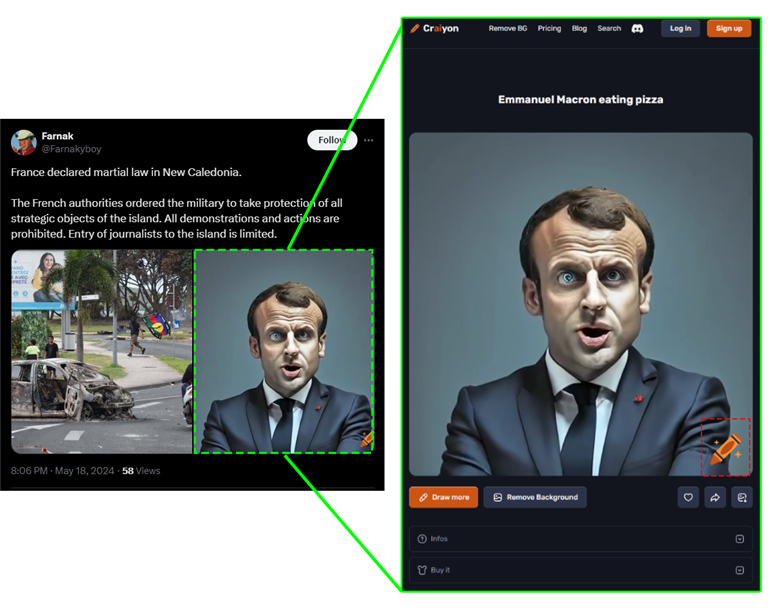
A history of spreading anti-French narratives
As noted in VIGINUM’s report, some of the accounts targeting France’s activity in New Caledonia used tactics that resembled an Azerbaijani campaign that targeted the Paris 2024 Olympic Games with anti-France narratives. Four accounts in our dataset shared two videos defaming the Olympic Games. Three of the accounts shown below were suspended at the time of writing. The posts comprised only hashtags and tags for European and international institutions, political personalities, and news organizations.
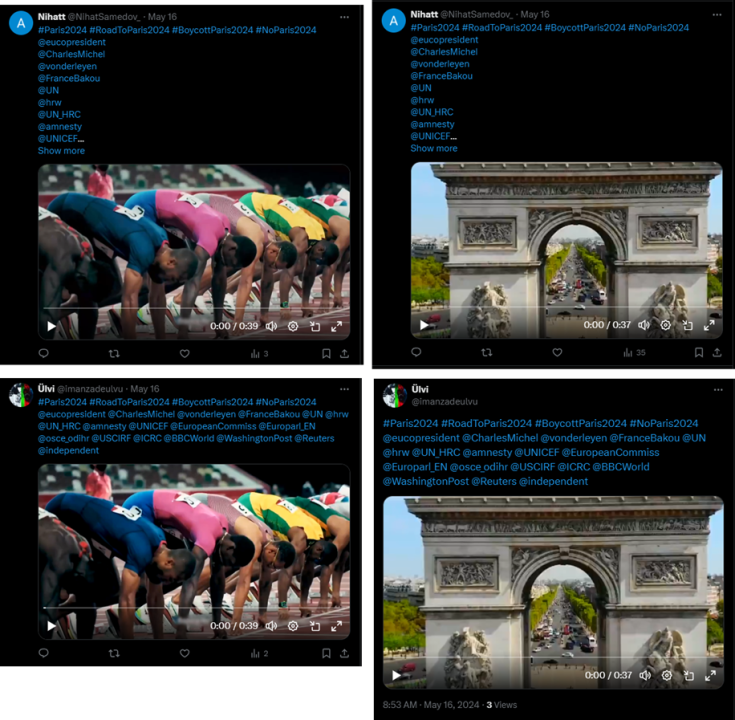
Further analysis of the posting activity of these two accounts throughout 2023 shows that they engaged in copy-pasta and trolling activity by replying to tweets, “France has no right to talk about democracy,” in various posts mentioning France and Azerbaijan. The replies were typically focused on two subjects, one claiming that “France murdered 1.5 million Algerians” and another accusing France of turning a blind eye “when rockets were fired from Armenia.”

Cite this case study:
“Azerbaijani operation spread anti-France content amid 2024 New Caledonia unrest,” Digital Forensic Research Lab (DFRLab), February 7, 2025,

